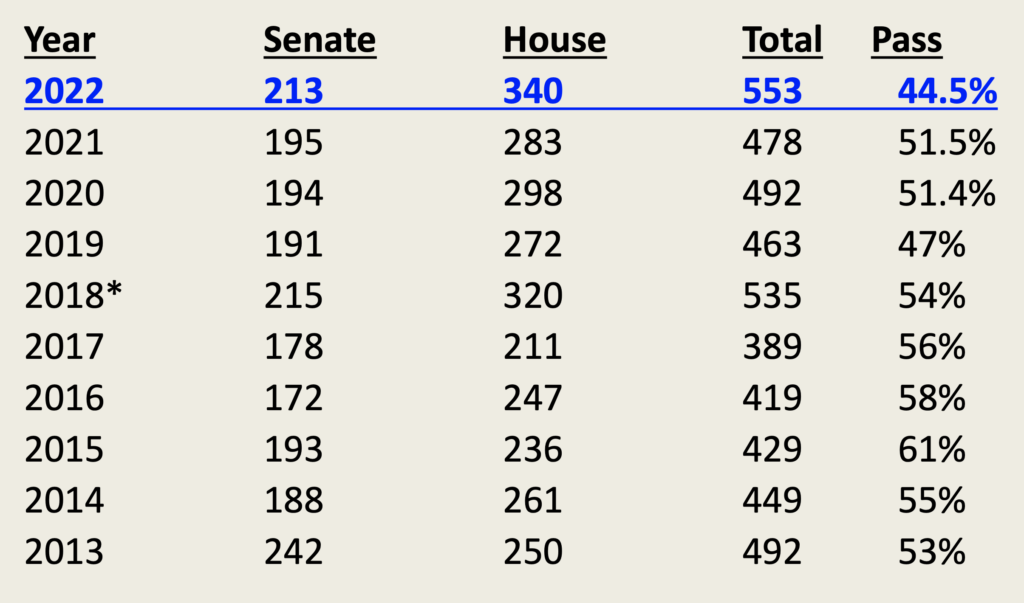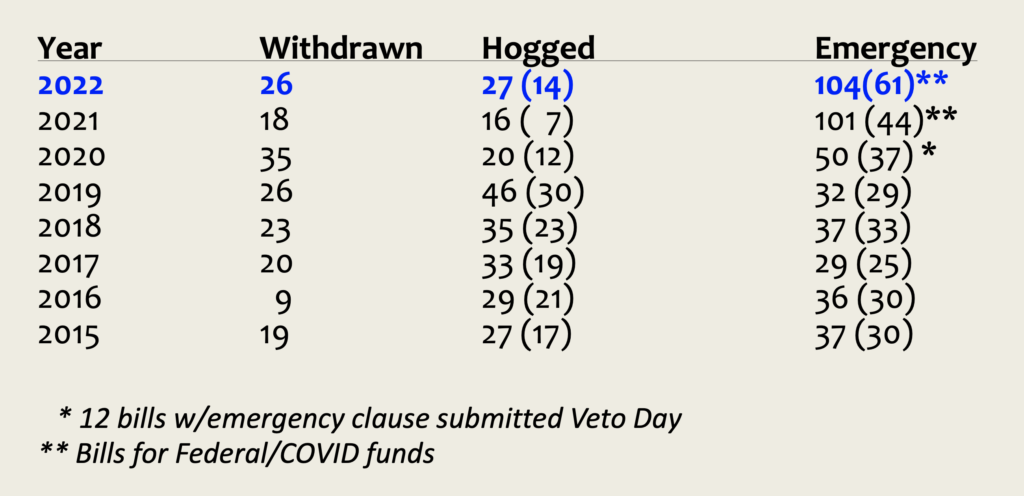South Dakota Chamber of Commerce and Industry exec David Owen includes some interesting numbers about our Legislature’s bills and pass rates. According to the count in Owen’s traveling slideshow summarizing the 2022 Session, this year’s Legislature proposed the most bills in a decade but passed the lowest percentage of bills in a decade:

Senators whipped up 8% more bills than their average number from the previous eleven years; House members threw 29% more bills than recent average in the hopper. But that 44.5% pass rate—the lowest since the 1927 biennial session—kept the number of new laws put on the books about the same as the average for the past decade.
If we expand Owen’s numbers back to 2011, we can compare bill generation and pass rates during the Daugaard Administration and the Noem Administration. During the eight years of Dennis Daugaard’s governance, the Legislature considered an average of 455 bills a year and passed 250, for an average pass rate of 54.9%. During the four years of Kristi Noem’s occasional occupation of the Second Floor, the annual average number of bills proposed has risen 9% to 497, but the average annual number of bills passed has dropped 4% to 241, for an average pass rate of 48.5%.
In other words, like the Governors under whom they operate, the Noem Legislatures talk more and do less.
Owen notes what I consider an alarming surge in the use of the emergency clause. The coronavirus pandemic has coincided with and perhaps driven a tripling in the number of bills proposed for immediate enactment:

Maybe the pandemic has necessitated swift government action and spending (though few of the emergency-clause bills proposed this Session have anything to do with fighting covid or providing healthcare or pandemic relief; they have far more to do with spending federal dollars on infrastructure and economic stimulus). But by Owen’s count, 61 of the bills passed by the Legislature—a quarter of this year’s enacted tally, twice the average from Owen’s listed pre-coronavirus Sessions)—denied citizens the right to refer those measures to a public vote. This high (I would say excessive) use of the emergency clause further weakens the Legislative power reserved to the people in Article 3 Section 1 of the South Dakota Constitution. Among the things we must do to improve our Legislature is to reverse this trend toward more use of the emergency clause. The much-abused emergency clause should be reserved for real emergencies, situations that, if not addressed by government action before July 1 (the usual enactment date for South Dakota laws), will lead to real chaos, death, and destruction. Absent that change, I would welcome a constitutional amendment that would allow citizens to refer emergency measures to a vote.
You fellows out there who want to legislate from the cheap seats should bring one of those measures, initiated, while they are still legal, to severely limit the number of law bills the legislatures can bring.
It would have to be a constitutional amendment, Grudz. Yeah, the number of bills introduced was high this year. On average over those years listed, it seems lower than the 1980s and 1990s. I don’t have a problem with the number of bills, if they are responsive to constituents’ concerns. Too many of the bills that are introduced now are bill mill bills, drafted by out-of-state special interests, whether ALEC or some business or christian or conservative interest group. Governor bills, also, seem to be less concerned with real issues in South Dakota, and more to curry favor with out-of-state fundraising outfits. All that needs to be wrung out of the Legislature, so they can start focusing on the real issues.
I would require legislators to disclose the source of their bills. If they brought in a bill draft, they would have to disclose the source of the drafted bill. It couldn’t be a laundered source, such as “I got it from Jane Doe.” If Jane Doe got it from ALEC, that would have to be disclosed as well. Likewise, if LRC used another state’s statute as a template, that would need to be disclosed. If the Governor got hers from Corey Lewandowski, he would have to disclose where he got the bill draft. My Mom always said, as she was hanging out the laundry, “A little fresh air and sunshine kills germs.”
These first two posts show in stark detail the difference between those currently in power (‘Pubs 40 + years) and those who would serve the public’s needs as they rise. Grudz, -typical GOP conservative SD style, infers only a few elites elected by the most money (out-of-state) and lies should make decisions while Donald Pay would have the involvement of affected, concerned citizens making their voice heard.
What are Republicans interested in? What is their platform, besides banning CRT, banning tranzgenders from sports, burning books by Jewish and people of color, making voting harder, taking away a woman’s right to choose, for white women anyway, banning masks, disparaging vaccinations for covid, they are killers after all, protecting the right to purchase semi-automatic weapons of war with 30 round magazines, they are really bad shots after all.. Not one positive thing about the party of Trump, except maybe confederate flag day?
Mr. Jake, you are righter than right.
Mr. Pay, a measure, initiated, could force a committee, appointed, to create a study group, toothless, to present a report, ignored.
This, sir, is the usual strategy from them in the know. Tell grudznick I am wrong.
No grudz…you are not wrong. Republicans obfuscate, duck, weave, jive, and hide. The idea is to really do nothing but pass occasional laws requiring the citizenry to conform to their vision of an orderly world. Only problem Republicans have is that dead bodies keep showing up in their wake.